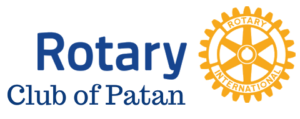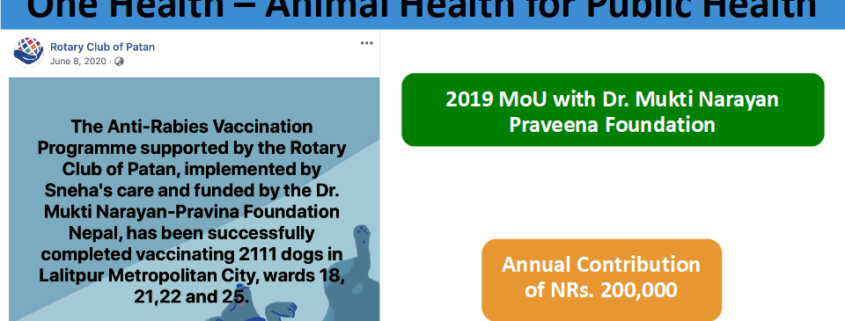One Health – Animal Health for Public Health
Background –
In June 2019, the Rotary Club of Patan (RCP) signed a Memorandum of Understanding with the Dr. Mukti Narayan Praveena Foundation whereby the Foundation agreed to make an annual donation of NRs. 200,000 to the Rotary Club of Patan for its ‘Animal Welfare for Public Health’ programme in the Lalitpur District. During the Rotary Year 2019-2020, the Rotary Club of Patan collaborated with the NGO Sneha’s Care, conducting an anti-rabies vaccination programme in Nakhu, Bhainsepati, Khokana and Bungamati areas of Lalitpur. Between mid-March 2020 to mid-April 2020 the Sneha’s Care team was able to vaccinate 2111 dogs despite the difficulties faced during the COVID-19 pandemic lockdown.
One Health –
The concept of ‘One Health’ approach was officially launched in September 2004 at the ‘One World, One Health – building interdisciplinary bridges to health in a globalized world’ conference in New York. This is a multi- sectoral and integrated approach for preventing and mitigating health threats at the Animal-Human-Plant-Environment interfaces with the objective of achieving public health, food and nutrition security, sustainable ecosystems, and fair-trade facilitation. The ‘One Health’ approach has been adopted worldwide for cross-sectoral and multi-disciplinary collaborations to effectively deal with the endemic, emerging, infectious, and zoonotic diseases.
Zoonotic Diseases –
Zoonotic diseases, also known as zoonoses, are those diseases and infections that are caused by germs/ microorganisms that spread from vertebrate animals to humans and vice versa. There are three classes: a) endemic zoonoses – which are present in many places and affect many people and animals; b) epidemic zoonoses – which are sporadic in temporal (time) and spatial (place) distribution; and c) emerging and re-emerging zoonoses – which are newly appearing in a population or have existed previously but are rapidly increasing in incidence or geographical range.
Global, Regional and National Context –
The health threats of emerging and re-emerging diseases including zoonoses at the animal-human-plant- environment interfaces are becoming more prominen and frequent. SARS-CoV-1, avian influenza, rabies, Nipah and Ebola outbreaks, as well as food-borne diseases and antimicrobial resistance (AMR), continue to have major impacts on our health, livelihoods, and economies. The current global pandemic of SARS-CoV-2 virus (COVID-19) makes it clear what devastating effects zoonotic disease can have.
In recognition of the global threat that the Highly Pathogenic Avian Influenza (HPAI H5N1) outbreak in 2003/2004 in Asia and other emerging zoonotic diseases posed, the Food and Agriculture Organization (FAO), World Health Organization (WHO), and World Organization for Animal Health (OIE) developed a strategic framework and a tripartite agreement, to work more closely locally, nationally, and globally, to attain optimal health for people, animals and our environment.
‘One Health’ challenges and benefits –
With rapid population growth, globalization and environmental degradation, health threats have become more complex. Solutions cannot be found by one sector alone. The ‘One Health’ approach leverages the idea that problems impacting human, animals, plants, and environmental health can be effectively resolved through improved coordination, communication, and collaborative actions across disciplines.
Specific intervention, such as rabies vaccination programmes; knowledge management; awareness raising; advocacy to garner political commitment; collaboration among all stakeholders within the ‘One Health’ approach contribute to consistent and synergetic decision-making, avoidance of gaps and duplication of effort. The multi- sectoral coordinated approach has been proven as a successful tool for managing public health risk with zoonotic potential.
Rotary Club of Patan’s plans –
The RCP ‘One Health’ team is exploring on broadening its work in the ‘One Health – Animal health for Public Health’
area this Rotary Year. The team is reviewing how the RCP could get involved in the multi-sector collaborative rabies
eradication project to achieve an even larger impact. The Rotary Club of Patan ‘One Health’ team members are: Rtns.
Mukti N. Shrestha, Khadak S. Bisht, Gabriele Mallapaty, Bijaya Mallapaty (Service Project Chair), and Nirmal Pradhanang (President).




Leave a Reply
Want to join the discussion?Feel free to contribute!